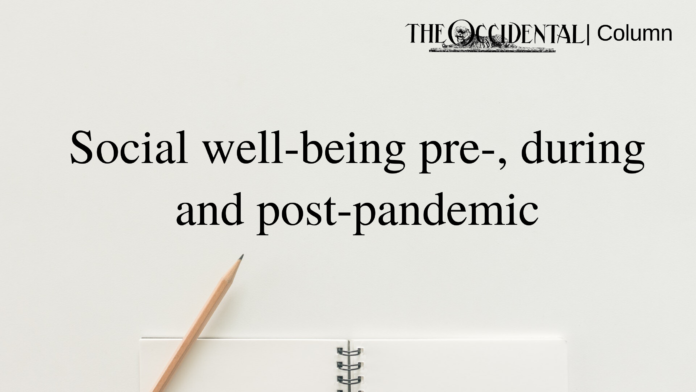After being sent home to Guangzhou, China, from my study abroad program in Germany, I was put in a mandatory two-week hotel quarantine. It was supposed to be the most isolating time of my life: I was not allowed to step outside of my hotel room, which had the width of only four lunges, and I had no interaction with any other human being except the nurse who would come to check my temperature twice a day. Strangely enough, I didn’t feel lonely.
Instead, I became more proactive in reaching out to friends and acquaintances, which I assume many people are doing in the time of “safer-at-home.” “Social distancing doesn’t mean social isolation,” I read on Active Minds at Oxy’s Facebook page. I would be reminded of someone whom I had not talked to in months and wanted to know how they were doing. I would text and schedule calls with people, with whom I otherwise would not have this level of contact. It is precisely the deprivation of interaction that prompted me to seek different kinds of interactions. I felt an overwhelming joy that I had never felt because it was the first time in my life when my social life was solely my choice. Instead of being passive in who I surrounded myself with, I could actively make decisions about who I wanted to spend time with, and as a result, the connections I built are of higher quality. This is one of the most important lessons I’ve learned in quarantine.
Thinking back on my previous social life, I had not always enjoyed it. I’d sometimes force myself to be with people, either to look good or so that I could assure them that I’m not anti-social and that I enjoy being around them. But in fact — I know this very well now that I enjoy life in quarantine — exposing myself to that much stimuli (social or in general) was against my nature. I have a high sensory processing sensitivity, meaning I am very susceptible to environmental subtleties and get easily overwhelmed by them. I had known this very early on when a lightly emotional story would stay in with me for a very long time, or it’d take me days to process a movie. Yet in social life, I struggled to say no to stimuli, lest that hurt my image. Or when I would muster up the courage to say no, there’d be a voice in me that said I am thinking too much or too negatively, that I should assume that things will go smoothly and I’d end up liking it, or that I would get used to the high amount of stimuli eventually.
Damn, I’ve been unkind to myself.
Quarantine has cut off most social stimulation in my life, and it has made me realize how little of it I actually need. But that is not the point of this article. The point is rather that:
- Life in quarantine encourages one to explore who and what they can be in the absence of other things and people, and we should cherish this opportunity for spiritual tranquility. We don’t often — and perhaps won’t easily — let ourselves pause and stop.
- It’s useful and necessary to know what and how much of something is right for you and then take the initiative to attain that perfect amount of fulfillment.
Quarantine has made me explore a social life that is proactive rather than reactive, and damn, that feels good.
The author for this piece is Yingfei Xin, a member of a chapter of the organization at Occidental College. Active Minds is a national organization that aims to reduce the stigma surrounding mental illness and promote good mental health.
![]()































